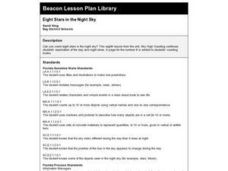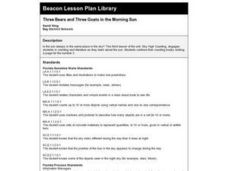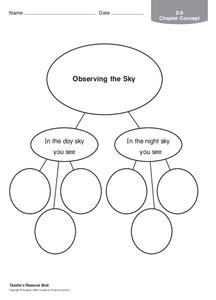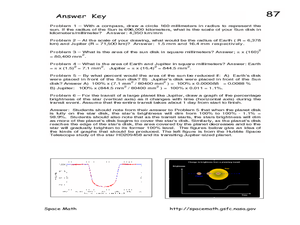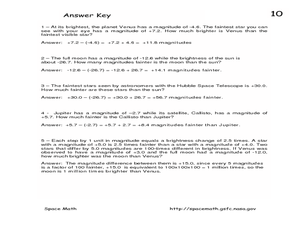Curated OER
How Hot is that Planet?
In this planet worksheet, high schoolers read about finding the temperature of a planet using the distance to its star, its reflectivity and the luminosity of the star. Students use a given equation to determine the surface temperature...
Curated OER
Voyage: A Journey through our Solar System
Young scholars build the Voyage scale model of the Solar System on a playground and "travel" to each planet. They recognize that the Sun and planets are tiny worlds in a vast space, giving them a new perspective on the Solar System, and...
Curated OER
Sky 3: Modeling Shadows
Students will construct models to demonstrate their understanding of shadows. Many questions and suggestions for variants on the activities are presented to allow you to tailor this activity to your particular needs. It is best to make...
Curated OER
Eight Stars in the Night Sky
First graders explore the day and night sky. They complete a number 8 page for their counting books.
Curated OER
The Earth, Sun Mood and Stars Unit (Planets too!)
Fifth graders prepare five activities to do then show their energy saving skills. In this investigative lesson students create five projects then participate in an energy saving demonstration.
Curated OER
Star Words
Students identify and categorize apostrophes. They create maps of the solar system and write simple sentences using apostrophes that describe each planet's characteristics.
Curated OER
Three Bears and Three Goats in the Morning Sun
First graders listen to the story Three Bears from the book, Three Tales of Three, focusing on the one-to-one correspondence while counting various items in the story. They create pages for the number 3 for their counting books.
Curated OER
What Can You See in the Sky?
In this objects in the sky activity, students will compare what they can see in the sky during the day and during the night. Students will complete 8 fill in the blank statements.
Curated OER
Observing the Sky
In this sky worksheet, students will write down 3 things they see in the sky during the day and 3 things they see in the sky at night. This worksheet is a graphic organizer.
Star Date
Solar System Scale Model Demonstration
Explore outer space and decorate your classroom with an astronomy project. Learners create a visual model with the creation of a scaled solar system using different sized balls.
Star Date
Build Your Own Galaxy
Don't just look at pictures of the Milky Way galaxy, build it with this hands-on activity in which scientists recreate the galaxy we live in.
Center for Math and Science Education
Solar System Launch
Trying to understand the vastness of outer space can be quite a challenge for young scientists. Help put things in perspective with this cross-curricular activity as students work in pairs creating scaled models of the solar system,...
media.yurisnight.net
Science Lesson Plan: Our Solar System: I Wonder?
Ever wonder why Pluto isn't considered a planet? Or how large the Earth is compared to the other inner planets? Explore the universe with a series of projects that simulate different aspects of our solar system. The activities require...
Voyage Solar System
Round and Round We Go — Exploring Orbits in the Solar System
Math and science come together in this cross-curricular astronomy lesson plan on planetary motion. Starting off with a hands-on activity that engages the class in exploring the geometry of circles and ellipses, this lesson plan then...
Glynn County School System
Milky Way Galaxy
There is more about the Milky Way that scientists don't know than what they do know—that leaves a lot to discover! A thorough lesson presentation explores the components of the Milky Way Galaxy and their behaviors.
Curated OER
Scale Model of the Solar System
Lead your class through the procedure to create a scale model of the solar system. This resource reinforces concepts of scale and the mathematics involved, as well as the planets. Attach paperclips and staples to index cards to show the...
Curated OER
Space Words and Comparatives
Which is bigger: the sun or the moon? Which is nearer: the planets or a star? English Language Learners first located a series of space-related nouns and adjectives in a word search, and then identify the comparative and superlative...
Core Knowledge Foundation
Astronomy Tell It Again!™ Read-Aloud Anthologys
A read-aloud anthology focuses on astronomy. Each week for three weeks, first graders are introduced to and listen to a text, answer comprehension questions, then complete extensions that include a learning activity and skills practice....
Core Knowledge Foundation
Third Grade Skills Unit 7: What’s in Our Universe?
Over four weeks, third graders participate in lessons that boost spelling, grammar, reading, and writing skills. Scholars explore spelling patterns, suffixes, singular and plural possessive nouns, quotations, and conjunctions....
Curated OER
How Does Climate Affect Your Environment?
Learners access the Global Sun Temperature Project website and research the relationship between the location and climate of a participating school to its building structure. They consider how climate affects the type of structures...
Curated OER
Groups, Clusters and Individuals
In this galaxies, clusters and planets activity, students solve 5 problems including determining sunspot groups on the sun in a particular day, finding the number of individual galaxies present, determining the number of stars in...
Curated OER
Kepler-The Hunt for Earth-like Planets
In this hunt for planets worksheet, students read about the Kepler satellite used to detect exoplanets. Students solve 6 problems including drawing a sun disk and determining the scale in kilometers/millimeter, finding the area of the...
Curated OER
The Stellar Magnitude Scale
In this stellar magnitude scale instructional activity, students use a scale showing the magnitude of objects in the sky to answer 5 questions about the brightness of the moon, the planets and stars.
Curated OER
The Sky Jeopardy
First graders reinforce concepts about sun, moon, day, night and sky by playing the Sky Jeopardy game. In the end, 1st graders get to nibble crackers in order to show the different phases of the moon.





